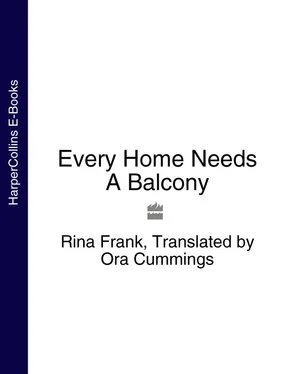Stanton Street is the place where reality TV was first invented.
Thursdays were the days on which bedclothes were not put out to air; instead, the carpets were brought out and laid over the balustrade. After being left alone to soak up a few hours of dry, hot, and dusty hamsin air, the carpets were beaten with the cruelty they deserved, so as to be clean for Shabbat. As if by mutual signal, in unison, with a rhythm that sounded like the beat of tom-toms, all the ladies of Wadi Salib thrashed the living daylights out of the carpets as they hung over the balconies of their homes.
All the ladies and my father.
There they all stood on the balcony railing, straining downward to reach the very edge of their carpet, potential shahids to cleanliness, until they caught sight of my father. As soon as Father stepped out with his carpet beater, all the ladies in the street started flirting with him.
“Hey, Moscu, when are you coming over to bang my carpet with me?”
“Hey, Moscu, is Bianca so worn out after last night that you’re out here banging in her place?”
When the ladies laughed at him, Father smiled back kindly and said that they were clearly dying to swap their husbands for him—and none of them ever denied it.
The main room in Lutzi’s apartment in Wadi Salib’s Stanton Street belonged, of course, to Tante Lutzi and her husband, Lazer. Lazer was a barber. He owned a barbershop downtown, next to the only decent café in the area. To tell the truth, the barbershop was more a hole in the wall, with two chairs and a single shared mirror. Since he was always appropriately dressed in a barber’s coat, the local gentlemen stepped in for a haircut, although he never failed to botch up their appearance with a phenomenal lack of talent.
We girls had our hair cut at home. We refused to go to his shop, claiming that it wasn’t fit for ladies. Lazer would place a kind of round plate on our heads, which served as a template around which to snip off the ends, and we’d finish up with a haircut that was a perfect circle. Until we revolted and no longer allowed him to touch us, my sister and I looked like a pair of round satellite dishes with bangs.
In fact, with our Uncle Lazer, “touch” was the operative word. He used to sit me on his lap and say that, as an uncle who loved his nieces, he was responsible for checking my growth, to make sure that everything about me was in order. His examination focused mainly on the glands on my chest, rather than on my height, which was measured against an inch tape and markings on the wall.
My sister, apparently, wasn’t fooled by Uncle Lazer’s honeyed words and told him to go measure the growth process of his own children, because only our mother and father and the school nurse had the right to check ours.
It was obvious that black-haired Yosefa, with her brown slanting eyes, was the smartest child in the neighborhood, and I was just pretty. There was an ongoing debate in our home over what would best suit my sister, who was destined for greatness, a future as a physician or a career in law; as for me, they just prayed that someone wealthy would marry me.
One day I was playing jacks downstairs when my sister called me from the balcony to come up immediately because Grandmother Vavika had died.
“So what?” I shouted back, even though I was almost six and had only one grandmother. I threw the ball vigorously and knocked over all the stones.
When I saw the ambulance parked at the entrance to the building, I stopped throwing the ball at the stones for a moment and watched as two white-uniformed male nurses got out, carrying a wooden stretcher. They entered the building, carrying the stretcher in an upright position as if it were a ladder; I lost interest and went back to my game.
I went up to our apartment only when I had beaten all the others as usual.
My sister was very agitated and said I had missed something important.
“What was there to miss at home, where everyone is miserable, whereas downstairs I squashed seven jacks singlehanded?” I asked indifferently.
“You missed God,” she said reproachfully. Yosefa was proud of the fact that she was the only one who had seen God, because she was standing alone on the balcony when the entire family was indoors beside our dead grandmother and I was stupidly playing jacks downstairs. And it’s a well-known fact that God reveals Himself on balconies.
My sister told me that she was standing on the balcony when suddenly a ladder descended from the skies; it was very, very long, like Jacob’s ladder, and two angels dressed in white went up to Grandmother and grasped her on both sides, and together, the three climbed up the ladder that reached up to the skies, not forgetting to wave good-bye to the lone girl standing on the balcony and watching their every move.
When they had reached the very edge of the sky, my sister, who was older than I by two years minus four months, told me that the heavens had opened, and God’s kindly face peeked down to welcome them home.
“So what does he look like?” I asked my sister grudgingly, piqued that she had seen God and I hadn’t.
“Very handsome,” answered my all-seeing sister. “He’s got black hair and green eyes. Looks a bit like our dad.”
Ever since, I have lived with the knowledge that I missed seeing God and His angels, and only my sister had the good fortune to see them. And she had even called me home, but I wasn’t listening.
It wasn’t love at first sight with the man, even though he was tall and handsome and she had always been attracted to tall, handsome men.
“I thought all the men in Spain were short,” she challenged him in English, in the kitchen, two weeks after he’d joined the staff of the Jerusalem engineer Ackerstein, where she too was employed. At first she had little faith in the amount of height taken up by a six-foot space—he gave the impression of being out of reach and exuded a cultured European scent. Over those two weeks when their eyes met, she had made do with a light nod of the head that instantly ruled out all options.
“I’m the proof,” he replied in English and shook her hand firmly. She didn’t know that it was possible to shake hands quite like that; she was used to handshakes that were more limp and involuntary. She wondered if he was Jewish and delved into the depths of her memory to try to discover if any Jews had remained in Spain after the Inquisition over five hundred years ago. She remembered that none had.
“Perhaps it’s because I’m a Barcelona-born Jew,” the man said, as if reading her thoughts.
“First time in Israel?” she asked him with uncharacteristic courtesy.
“Seventh time in the last three years,” he replied.
Man of the world, she thought to herself. She herself was twenty-two and didn’t even own a passport; at that time the Sinai Peninsula was still under Israeli control, and that was the most “abroad” she had ever visited.
“What’s there to love about Israel?” she asked enviously. He had flown so many times, and she had never seen the inside of a plane, not even on the ground.
“The women,” the guy answered, “they are all so beautiful and so tall.” He dropped his glance from his six feet down to her five-foot-nothing. “And I haven’t been to Haifa yet. I’m told that Haifa women are the most beautiful of all.”
“Whoever told you must know,” she replied, expecting him to ask her if she was from Haifa, but he didn’t.
“So, what is about Israel that you love so much and makes you fly here every couple of days?” she asked, and he replied, “The fact that they are all Jews. I find it very exciting to think that everyone you see in the street is Jewish—even the street cleaners.”
“The street cleaners are more likely to be Arabs,” she said, trying to put a damper on his enthusiasm.
Читать дальше












